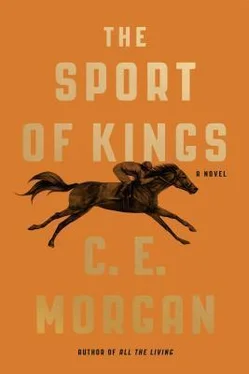December 20: Moses Henderson, James Allen, Mr. Lewis, Scott Bishop, the brothers Da Loach, Clinton Montgomery, George Baily, Cope Mills, Samuel Bland, William Stewart, and two unidentified men.
December 21: James Stone, John Warren, Henry Davis, Henry Fitts, two pregnant women, and three unidentified men.
December 22: Joseph James, Jerry Burke, George Finley, and H. Bromley.
December 23: Sloan Allen, George King, seven men together in Georgia, James Martin, Frank West, Mack Brown, Mr. Brown, and one unidentified man.
December 24: Kinch Freeman, Eli Hilson, James Garden, five together in Virginia, and fourteen unidentified men in Meridian on this day.
Christmas Day: William Fluid, Calvin Thomas, J. H. McClinton, Montgomery Godley, King Davis, and Mr. and Mrs. Moore and more and
Filip Dunbar was one of the lucky ones, or so they say. Surely he walked out of Paris of his own free will that freezing Christmas Eve night without a word to his wife, without even his jacket or shoes. And the only things left hanging in Kentucky that Christmas were the ornaments on the trees, or so they say.
* * *
If Maryleen heard nothing, it was likely because her father had come down with the flu over Christmas and not attended church, so of course her mother had not gone but stayed home to tend to her husband, and Maryleen had not gone because she hadn’t seen the inside of a church since she was thirteen, when she’d announced she wouldn’t worship a God as cruel as this one. (“Maryleen, you fixing to go to hell!” “I’m sure the food’s better there.”) As far as she was concerned, all religious foolishness ended right then and there, even if — and she would be the first to acknowledge this — religion had saved the black race from certain suicide. But she wasn’t the black race and didn’t answer to it; she was Maryleen, and she wasn’t nearly as stupid as most folks, black or white.
If she heard nothing, it might have been because December was the busiest month in her calendar; it was hog-killing time, and she didn’t work at the Forge house from the twentieth of December until the second of January. Instead, she was busy cooking in her parents’ hall-and-parlor cottage on the outskirts of Claysville. Her mother told her with no small amount of resentment curdling her voice that Maryleen was the only colored girl in Bourbon County who got the holidays off, but Maryleen had insisted upon it when she was hired; take it or leave it. They accepted it, because her reputation preceded her, and her trial cooking sealed the deal. She had authentic talent, which she had learned was a powerful bargaining chip, and she used it to her advantage. Plus the white lady had seemed to actually like her a little bit, or perhaps merely sensed Maryleen’s dislike, which had worked its strange allure. Lavinia had probably never been disliked before. That sort of thing could unsettle a white woman and make her needy, the way cats only want to be petted by the hand that won’t touch them.
If she heard nothing, it was probably because hog killing was an all-consuming chore. Maryleen didn’t give a damn about the old-timey ways, and she was certainly aware she could purchase any pork product she wanted down at the A&P, but she did give a damn about her cooking and knew that no store-bought lard or fatback competed with what she could get from hogs fattened on their property by her own hand and then butchered in December when the old cutter came down from Georgetown. That man, born in another century to ex-slaves, would wait for a cold snap and the moon to increase; this kind of backwoods superstition and conjuration threatened Maryleen’s always tenuous relationship with patience, but she tolerated it with unusual forbearance, because the man could core a pig like it was no more trouble than an apple. His butchering was fast and deliberate and neat: he built the scaffolds himself from last year’s wood, then death came quick with barely any squealing, then the carcasses were scalded and hoisted up and hung with a gambrel. Even her father managed to put his Bible down for a few hours to aid in the process, and all the while Maryleen either helped with the cutting or stood in the kitchen, boiling coffee for the men. She wouldn’t touch coffee herself, considering it a drug no less harmful than any liquor and not something a human with good sense would tolerate in the body. The men sliced the hogs so their entrails spilled down like loose mottled sausages into the old copper pots, and from the scaffolding the shaved carcasses hung empty like glabrous, translucent lanterns for three days — bright pink with the winter sun lighting them just so — until they could be cut apart. During those three days, Maryleen went to Lexington to shop for ingredients, paying for it all herself as a Christmas gift to her parents, and then she spent the last week of the year undressing the pigs and cooking from dawn until dark. She separated the leaf lard, then rendered it in huge cast iron pots in what had once been a summer kitchen and which now saw no use except during hog-killing time; various cuts were carved, trimmings rendered down for common lard for when she didn’t need a fine pastry flavor; she saved some lean with the fat to be used later in sausage making. Then she laid away middling and jowl bacon seasoned with saltpeter and brown sugar in a meat box, and made her own sausages from the trimmings. Most of the pig couldn’t be used right away, but she was now set for a year of deep, bold flavor, at least in her own home. In the Forge house, everything was store-bought with flavors as shallow as an August pond, so she had to work twice as hard to create half the depth, but so be it. She doubted that kind of people could even tell the difference between a well-raised meat and supermarket cardboard. White folk were stupid like the sun was bright. Which was to say, shatteringly.
So she was tired when she walked the three miles to the Forge house at five in the morning on the second of January, 1954. She was sweating through her blouse despite the cold when she finally approached the house, which stood tomblike on its hillock alongside the slushing creek, barely visible against the cinder-colored sky. It was not yet dawn, but normally there would already be at least two lights burning in the upper house and in a barn as well, where a worker would be tending to the horses. But the house was dark. Only when Maryleen slipped into the kitchen did a single bulb illuminate a room on the second floor, but that she didn’t see.
The kitchen was so quiet, hollow-feeling, and undisturbed that she did something unusual: she lit a fat, drippy beeswax candle instead of switching on the bulb over the stove. It preserved a bit of the early-morning peace, while she laid out buttermilk and butter to warm for biscuits, and rooted around for peach jam in the outdated icebox. She reached behind her for the egg bowl, which Filip placed on the butcher-block island every morning prior to her six o’clock arrival — but no egg bowl. She swiveled around, staring at the deeply scarred block, exactly at the spot where the bowl should have been, and thought, why that lazy old drunk—
The boy was in the room. He stood there in his boxer shorts and a rumpled white undershirt, which was risen up and showed some of his pale stomach. The sight of his flesh made Maryleen rear back in distaste and alarm. Not only was he dressed improperly, but he appeared ravished and worn, as though he’d suffered some wasting disease over the holidays that left his hair sweaty and deep hollows like blackened lime slices beneath his eyes. Even in the mild, shifting candlelight, he looked like a buzzard off a gut pile.
“What’s wrong with you? You ill?” Even her concern sounded like an insult.
Henry didn’t move further into the room. He just shook his head, exhaustion lining his face.
Читать дальше
Конец ознакомительного отрывка
Купить книгу












